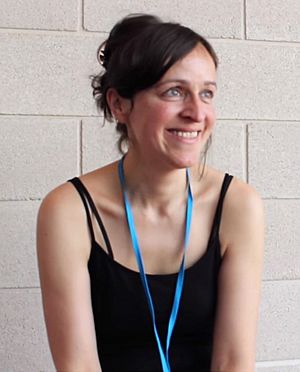Irene Miguel-Aliaga facts for kids
Quick facts for kids
Irene Miguel-Aliaga
FRS FMedSci
|
|
|---|---|

Miguel-Aliaga in 2015
|
|
| Alma mater | University of Oxford (DPhil) |
| Awards | EMBO Member (2017) Suffrage Science award (2018) |
| Scientific career | |
| Institutions | Imperial College London National Institute for Medical Research University of Cambridge Harvard University Linköping University |
| Thesis | Spinal muscular atrophy : of flies, worms and men (2000) |
| Doctoral advisor | Kay Davies |
Irene Miguel-Aliaga is a Spanish-British scientist who studies how our body parts, called organs, can change. She is a Professor of Genetics and Physiology at Imperial College London. Her work looks at how adult organs can change their shape and function when the environment around them changes. In 2022, she was chosen as a Fellow of the Royal Society, which is a big honor for scientists.
Contents
Early Life and Education
Irene Miguel-Aliaga grew up in Barcelona, Spain. She went to the University of Oxford in the United Kingdom for her PhD. There, she studied human diseases using small animals like worms and flies. Her supervisor was Kay Davies.
Research and Discoveries
After finishing her PhD, Irene Miguel-Aliaga moved to the United States. She worked at Harvard University as a postdoctoral researcher. This is a scientist who does more research after getting their main degree. Later, she moved to Linköping University in Sweden. There, she studied the nerve cells of Drosophila, which are tiny fruit flies.
She then joined the National Institute for Medical Research. Here, she looked at special nerve cells in the gut that make insulin. In 2008, she started her own research team at the University of Cambridge. Eventually, she moved to Imperial College London, where she is now a professor.
How Organs Change
Professor Miguel-Aliaga's main research is about how adult organs can change. She wants to know why organs change their shape and how they work when things around them change. For example, how does what we eat affect our organs?
She often studies the gastrointestinal tract, which is our digestive system. This system is great for studying how an organ senses signals. These signals can come from inside our body or from the outside world.
Gut-Brain Communication
Irene Miguel-Aliaga also compared the guts of males and females. She found that the way the brain and gut talk to each other is different in males and females. This difference can affect how the gut works. Her team discovered how the gut communicates with other organs in the body.
She uses Drosophila fruit flies in her research. These flies are very useful because they share more than 60% of their genes with humans. This means what she learns from flies can often help us understand human bodies better.
Awards and Recognitions
Irene Miguel-Aliaga has received many awards for her important scientific work:
- 2012 European Molecular Biology Organization young investigator
- 2015 Journal of Cell Science One to Watch
- 2017 Elected a member of the European Molecular Biology Organization (EMBO)
- 2018 Suffrage Science Women in Science Award
- 2019 Elected a Fellow of the Academy of Medical Sciences (FMedSci)
- 2022 Elected a Fellow of the Royal Society (FRS)
- 2022 Mary Lyon Medal
Key Publications
Some of her important research papers include:
- Enteric neurons and systemic signals couple nutritional and reproductive status with intestinal homeostasis
- The digestive tract of Drosophila melanogaster
 | Calvin Brent |
 | Walter T. Bailey |
 | Martha Cassell Thompson |
 | Alberta Jeannette Cassell |

